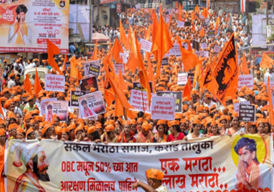Maratha Quota
Why in the news?
The Maratha reservation agitation in Maharashtra took a violent turn, with incidents of arson and vandalism against two elected representatives from rival factions of the Nationalist Congress Party (NCP).
- Chief Minister Eknath Shinde expressed concern that the Maratha reservation movement was losing direction, and quota activist Manoj Jarange-Patil continued his demands.
- Chief Minister Shinde announced the formation of an advisory board of three retired judges to address the Maratha reservation issue, and he mentioned that 1,530 Maratha community members with old Kunbi (OBC) records would begin to receive OBC reservation benefits.
Maratha Reservation
Historical Perspective
- The Maratha reservation issue in Maharashtra has historical roots dating back to the colonial era and the early days of independent India.
- The British colonial government classified the Marathas as an agricultural caste with social and educational backwardness.
- After independence, the Indian government categorized Marathas as an Other Backward Class (OBC) in some regions, providing them with certain reservation benefits.
Who Are the Marathas
- The Marathas are a prominent and historically influential community in Maharashtra, known for their role in the Maratha Empire founded by Chhatrapati Shivaji in the 17th century.
- They are primarily associated with the agrarian society in Maharashtra and have a significant presence in the state.
Reasons for Their Demand
- The demand for Maratha reservation stems from the perception that a substantial section of the Maratha community faces social and economic disadvantages.
- Advocates argue that historical classification as OBCs doesn’t adequately represent the community’s social and educational conditions, leading to a push for additional quotas.
Government Response
- The Maharashtra government has addressed the demand for Maratha reservation by forming various committees and commissions to study the issue’s socio-economic aspects.
- In 2018, the Maharashtra legislature passed a law granting 16% reservation to the Maratha community in government jobs and education.
- However, the implementation of the reservation law faced legal challenges (reservation criteria), leading to uncertainty and protests.





